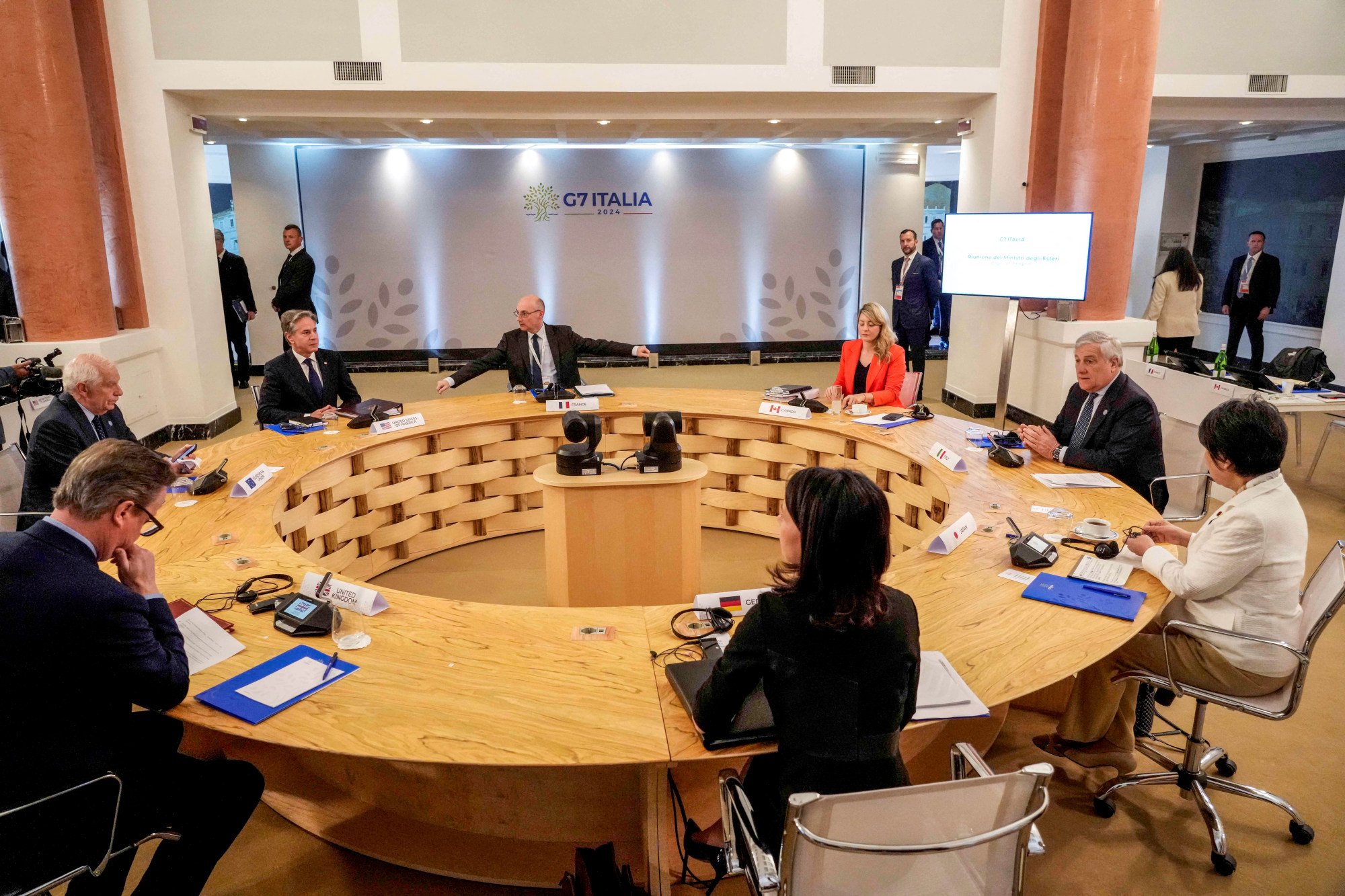
Beijing and Hong Kong authorities condemn G7 and EU statement over Article 23 legislation, national security law
- Commissioner’s office of China’s Foreign Ministry in Hong Kong says ‘double standards’ over security laws ‘are extremely hypocritical’
- Response triggered by statement from G7 foreign ministers and the EU expressing concerns about ‘deterioration of pluralism and civil and political rights’ in city
Beijing’s foreign ministry arm in Hong Kong and the local administration have condemned a statement made by G7 foreign ministers and the European Union raising concerns about the city’s national security laws.
The commissioner’s office of China’s Foreign Ministry in Hong Kong issued a strongly worded statement on Saturday urging external forces to stop interfering in the country’s internal affairs.
“It is really puzzling that some Western countries are uneasy about the legitimate measures taken by [Hong Kong] to safeguard national security,” an office spokesman said.
“Such double standards are extremely hypocritical and fully expose their true purpose of using Hong Kong to contain China.”
The spokesman said the US and Western countries had the world’s most stringent national security laws, with the former introducing more than 20 related laws, while Britain also passed a new bill last year defining “foreign interference” as a criminal offence.
Hong Kong’s domestic national security law had plugged loopholes in protecting the city’s safety, which was a turning point in driving it from chaos to order, he said.
The new Safeguarding National Security Ordinance complements the national security law imposed by Beijing in 2020.
Hong Kong authorities also condemned the statement by G7 foreign ministers and the European Union as “unfounded and biased”.
“The HKSAR government strongly urges these foreign governments with ulterior motives to stop smearing and interfering in Hong Kong affairs which are internal affairs of China,” the government said on Saturday.
“It is incumbent upon foreign governments to ensure that their remarks concerning the national security law and the [Safeguarding National Security] Ordinance are fair and just, and stop making scaremongering remarks.”
‘Historic moment’: Hong Kong passes Article 23 law after marathon session
Foreign ministers of Canada, France, Germany, Italy, Japan, Britain and the United States as well as the high representative of the European Union had addressed Hong Kong in a statement on Friday after a Group of 7 (G7) ministerial meeting on the Italian resort island of Capri.
“We express our concerns about the deterioration of pluralism and civil and political rights in Hong Kong since the 2020 national security law,” the statement said.
“We re-emphasise these concerns following the recent passage of the Safeguarding National Security Ordinance under Article 23 of the Basic Law, which will further erode autonomy, human rights and fundamental freedoms in Hong Kong.”
The ministers said the new domestic security law would “make it harder” to work and do business in the city, while undermining Hongkongers’ ability to maintain free and open exchanges with the wider world.
“We reiterate our call on China to uphold its commitments under the Sino-British Joint Declaration and the Basic Law, which enshrine rights and freedoms and a high degree of autonomy for Hong Kong,” the statement added, referring to the city’s mini-constitution.

The Hong Kong government responded the next day, alleging that G7 and EU were “deliberately misleading the public and smearing” the pair of security laws enacted in the past four years.
“The G7 foreign ministers and the high representative of the EU neglected the relevant provision and lashed out wantonly, fully exposing their malicious intentions,” the government said.
It also defended the new ordinance for targeting acts endangering national security, adding that it would not affect normal business operations and the global exchanges of local institutions, organisations and individuals.
Visiting UK minister to press Hong Kong authorities over ‘erosion’ of rights
“Safeguarding national security is an inherent right of all sovereign states. Many common law jurisdictions, including Western countries … have enacted multiple pieces of legislation to safeguard national security,” the government said.
“Turning a blind eye to the fact and making exaggerated remarks, the G7 foreign ministers and the high representative of the EU have demonstrated typical political hegemony and hypocrisy with double standards.”
The statement added to a growing list of “rebuttals” issued by the city authorities to counter criticism by Western governments and politicians.
It also coincided with the China visit by British Minister for Indo-Pacific Anne-Marie Trevelyan, who has included Hong Kong on her itinerary.
The Foreign, Commonwealth and Development Office in the United Kingdom has said Trevelyan will raise concerns on the national security laws as well as issues about the erosion of rights and freedoms in Hong Kong.


